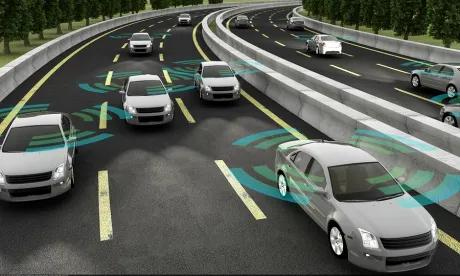In April 2018, China released its nationwide automatic vehicle road testing rules, the Intelligent Internet-connected Vehicles Road Test Administrative Rules (for Trial Implementation) (the “National Rules”), which took effect on May 1, 2018. “Intelligent Internet-connected vehicles,” as defined under the National Rules, are commonly referred to as “intelligent vehicles” or “autonomous vehicles,” which involve a system of advanced sensors, controllers, actuators, etc. that may ultimately become a substitute for human drivers. The National Rules governs three categories of autonomous vehicles depending on the level of automation and human interaction required, i.e., conditional automation, high-level automation and full automation.
Prior to the release of the national Rules, selected Chinese cities including Beijing, Shanghai, Baoding and Chongqing had already implemented their own respective local road test rules for autonomous vehicles, and Shenzhen’s local proposals were at public consultation phase. The National Rules are largely consistent with the already existing various local rules, and provide an example for additional local governments to formulate their own detailed implementation rules.Highlights of the New National Road Testing Rules
Eligibility requirements for applicants for the road testing permit
Autonomous vehicle road testing applicants must, among other things:
-
- be a PRC-incorporated legal entity;
- have manufacturing or R&D capabilities in the automobile industry; and
- purchase traffic accident insurance that has a coverage of no less than RMB 5,000,000 (approximately US$ 800 thousand), or provide a letter of guarantee of the equivalent amount for each testing vehicle to cover potential traffic accident damages.
Eligibility Requirements for Drivers
Autonomous vehicle road testing drivers must, among other things:
-
- have at least three years’ driving experience;
- always remain seated and be capable of switching from automatic to manual driving mode any time during testing;
- have no serious traffic violation record from the preceding year;
- have no record of driving under the influence of drug or alcohol; and
- have no record of causing death or serious injury in traffic accident.
Eligibility Requirements for Testing Vehicles
Autonomous testing vehicles can either be manufactured domestically or imported. All testing vehicles must, among other things:
-
- first pass a closed-area road test, and also tests carried out by a local third party agency for dozens of automated functions, before being eligible for testing on public roads;
- satisfy all the compulsory safety requirements of ordinary cars except for durability requirements;
- have information recording, storage and online monitoring functions;
- have the ability to record and store for a period of no less than three years, at least 90 seconds of data prior to any potential car accident or instances of losing control; and
- have the ability of real-time transmission of vehicle control mode, location and motion status data such as including speed and acceleration.
The Application Process
Local branches of the three most relevant Chinese authorities overseeing this area, namely the Ministry of Industry and Information Technology (MIIT), the Ministry of Public Security (MPS), and the Ministry of Transportation (MOT), will jointly form a panel of experts to review the road test applications received. Once approved, the MPS will issue a temporary license plate to the testing vehicle. Autonomous vehicles are only allowed to run on designated roads, and the testing period generally won’t exceed 18 months. In the case that the testing vehicle seriously violates the traffic rules, the panel reserves the right to revoke the road test approval and the temporary license plate.
Traffic Accident Liability
The driver shall be deemed as the actual driver in control and be held accountable for any liabilities.
Analysis
The National Road Test Rules represent a big step forward towards China’s ambitious goals in the global race to advance automatic driving technologies. The Automobile Industry Medium-to-Long Term Development Plan (Apr. 6, 2017) envisions that in China “by 2020, more than 50% of new vehicles will be equipped with a driver assistance (DA), partial automation (PA) or conditional automation (CA) system, and 10% of new vehicles will be equipped with Internet-connected DA system; and by 2050, the percentage rate will be increased to 80% and 25% respectively, while high-level automation and full automation vehicles will begin to come into the market.” We expect that the abovementioned tested functions will become a trend for new vehicles in the future in China .
The release of the National Rules seems to be good news for automobile companies (i.e., OEM manufacturers), domestic and foreign alike, that are seeking to gain a place in China’s emerging autonomous vehicle market. This is particularly so in light of the Chinese government’s recent announcement in April 2018 to further open up market access and lift long-standing restrictions that capped foreign shareholding ratio in PRC-incorporated automakers to 50%. Accordingly, in the future, wholly foreign owned PRC-incorporated automakers will be permitted in China. According to a press release by China’s National Development and Reform Commission (NDRC) – the country’s top industry policy maker – China will lift such restrictions on the manufacturing of special-purpose vehicles and new energy/electric vehicles in 2018, on commercial vehicles by 2020, and on passenger vehicles by 2022.
However, the National Rules remain silent on the finer details and procedures for making an application for road testing, and do not set out any objective review criteria. This would indicate that practically speaking, the Chinese authorities will have much discretion in granting the road test application approval.
The National Rules are also surprisingly silent on the controversies surrounding high-quality map data in China. Under the current rules, foreign-invested companies are prohibited from conducting ground mobile surveying, compiling electronic maps, or engaging in certain other surveying and mapping activities in China. As a result they would likely have to cooperate with a qualified domestic surveying and mapping company for map data and obtain prior-approval from the National Administration of Surveying, Mapping, and Geo-information (NASMG) under a 2016 requirement. Such approvals are not easily obtained in practice. Accordingly, while it is encouraging that competing global players looking to enter China’s emerging autonomous vehicle market will now be able to make basic road test applications to the Chinese authorities and establish wholly-owned PRC-incorporated factories, these companies may face other continuing challenges where access to such data is regarded as indispensable to be a viable player.
Runze-Li, a legal consultant, contributed to this piece.





 />i
/>i

